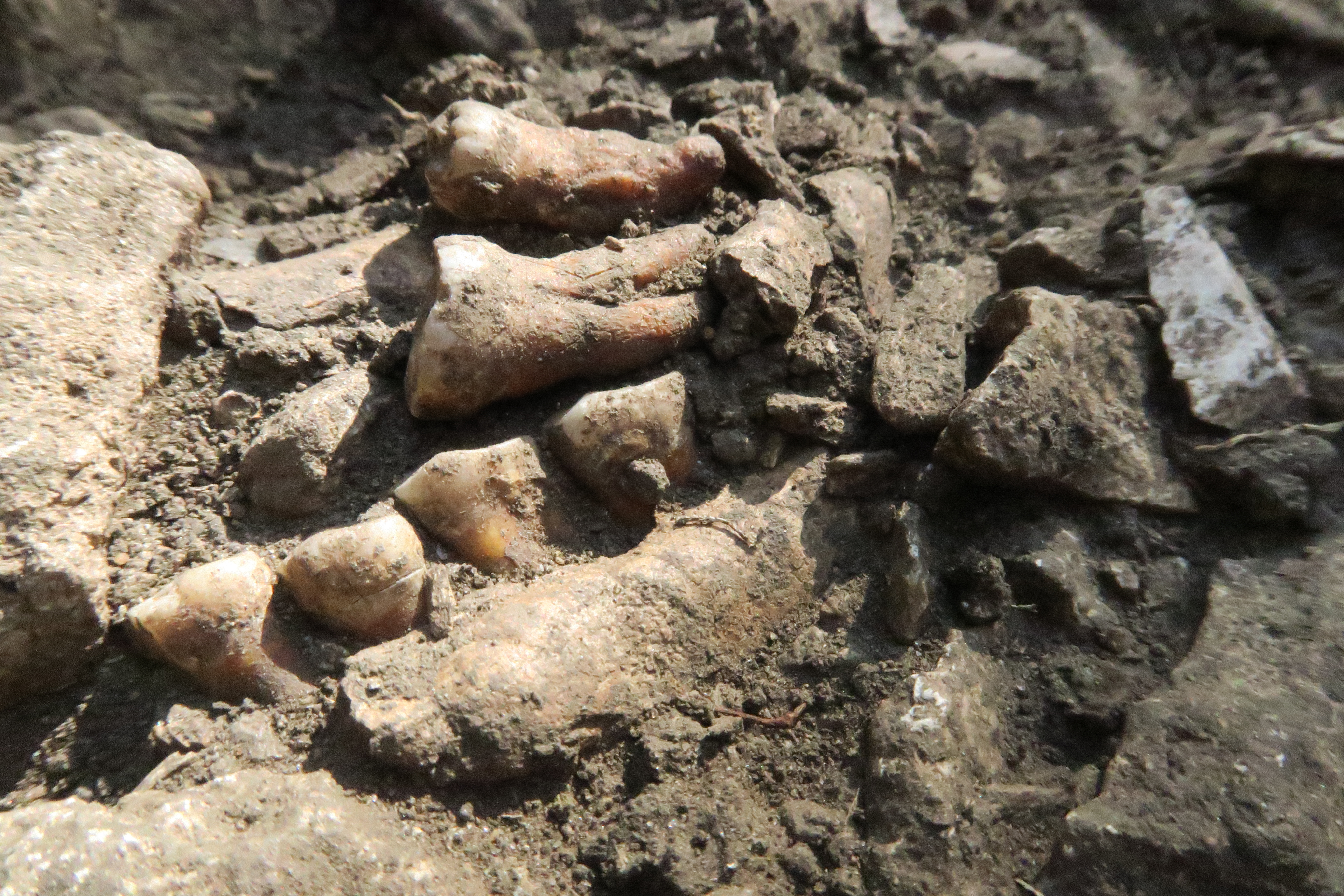Human Evolution
Ancient DNA Reveals Neanderthal Group Was Isolated for 50,000 Years
A new study, based on the remains of a Neanderthal nicknamed Thorin, is shaking up what archaeologists long thought about these early humans in Europe
Fossils Shed New Light on Small 'Hobbit-Like' Humans That Lived on a Remote Island
Two teeth and a small adult arm bone found in Indonesia suggest the ancestors of Homo floresiensis were even shorter than scientists previously thought
Early Humans Migrated Out of Africa Several Times, DNA Study Suggests
Homo sapiens interbred with Neanderthals as early as 250,000 years ago and may have ultimately bred them out of existence, according to new research
Indonesian Cave Painting Is Oldest-Known Visual Storytelling
The depiction of three human-like figures interacting with a pig dates to 51,200 years ago
50,000-Year-Old Neanderthal Bones Have Remains of Human Viruses, Scientists Find
The preliminary analysis is a first step in testing the theory that infectious diseases played a role in Neanderthals' extinction
Long-Distance Running May Have Evolved to Help Humans Chase Prey to Exhaustion
Scientists found hundreds of recent examples from around the globe of hunters using "endurance pursuits" to tire out their prey, furthering the debate over the hunting technique
Tracking Humans’ First Footsteps in North America
At a site in New Mexico, a new discovery rewrites the human history of the continent
Meet Shanidar Z, a Neanderthal Woman Who Walked the Earth 75,000 Years Ago
After carefully piecing her skull back together, archaeologists and paleoartists have created a lifelike 3D reconstruction of the woman's face
Dentist Discovers Human-Like Jawbone and Teeth in a Floor Tile at His Parents' Home
Scientists are planning to study the specimen, embedded in travertine from western Turkey, in hopes of dating and identifying it
Extensive Desert 'Lava Tubes' Sheltered Humans for 7,000 Years, Archaeologists Find
Formed after volcanic activity, the underground caves periodically hosted early humans and their livestock in Saudi Arabia, facilitating cultural exchange
Modern Indian People Have a Wide Range of Neanderthal DNA, Study Finds
Genomes of Indian people today reveal links to a prehistoric migration and a group of Iranian farmers, as well as several new sequences from the Neanderthal genome
The Dirty Secret About How Our Hands Spread Disease
The human hand is an incredible tool—and a deadly threat
Why Don’t Humans Have Tails? An Old Genetic Mutation Could Explain Why Monkeys, but Not Apes, Have the Extra Appendage
Scientists have pinpointed a genetic change that might have led the ancestors of humans to lose their tails
How Did Humans Evolve to Use Everyday Tools?
An anthropologist explains why we experience many objects, from tennis rackets to cars, as extensions of our bodies
ADHD Traits Might Have Helped Hunter-Gatherers Collect More Food While Foraging, Study Suggests
Participants who self-reported ADHD behaviors were better at an online berry-picking game than those who did not report such traits
Great Apes Love to Tease, Poke and Pester, Suggesting the Urge to Annoy Is Millions of Years Old
The desire to get a rise out of others is a 13-million-year-old trait humans and great apes share with a common ancestor, new research suggests
Stone Age Wall Discovered Beneath the Baltic Sea Helped Early Hunters Trap Reindeer
Made up of some 1,600 stones, the submerged “Blinkerwall” might be Europe's oldest known megastructure
Humans and Neanderthals Lived Side by Side in Northern Europe 45,000 Years Ago, Study Finds
Archaeologists identified bone fragments of prehistoric modern humans in Germany, suggesting several millennia of coexistence with Neanderthals before the species disappeared
Ancient DNA From Eurasian Herders Sheds Light on the Origins of Multiple Sclerosis
Genetic variants linked to the risk of MS were brought to Europe during a migration around 5,000 years ago, a new study finds—and they might have helped herders survive
What Caused the Mysterious Extinction of 'Giganto,' the World's Largest Ape?
The massive primates were unable to shift their diet to keep pace with a changing climate, according to a new study, forcing them to eat less nutritious bark and twigs
Page 1 of 19

:focal(750x500:751x501)/https://tf-cmsv2-smithsonianmag-media.s3.amazonaws.com/filer_public/06/08/06083a62-fc31-46a0-a2c1-981fa9ade827/untitled_design_15.png)
:focal(1750x1175:1751x1176)/https://tf-cmsv2-smithsonianmag-media.s3.amazonaws.com/filer_public/97/36/973642de-8855-4633-93eb-3facdabad0ea/gettyimages-853018002.jpg)
:focal(1082x686:1083x687)/https://tf-cmsv2-smithsonianmag-media.s3.amazonaws.com/filer_public/4a/cd/4acde48c-3842-4a85-b4be-14194caa5e26/dated-rock-art-panel-at-leang-karampuang_web.jpg)
:focal(1814x1209:1815x1210)/https://tf-cmsv2-smithsonianmag-media.s3.amazonaws.com/filer_public/d5/88/d588344a-515e-45b7-9a36-f64ded4ec888/gettyimages-151056502.jpg)
:focal(2750x1833:2751x1834)/https://tf-cmsv2-smithsonianmag-media.s3.amazonaws.com/filer_public/44/eb/44ebb302-b824-4379-ac97-370716e3a5e7/gettyimages-1239569525.jpg)
:focal(713x539:714x540)/https://tf-cmsv2-smithsonianmag-media.s3.amazonaws.com/filer_public/28/ec/28ec3d59-8bc5-4f28-b509-1c53dc070e48/jun2024_e17_prologue.jpg)
:focal(4096x2750:4097x2751)/https://tf-cmsv2-smithsonianmag-media.s3.amazonaws.com/filer_public/36/ba/36ba428b-e327-41b9-a50c-3a8cbdd38649/cambridge_5.jpg)
:focal(540x360:541x361)/https://tf-cmsv2-smithsonianmag-media.s3.amazonaws.com/filer_public/05/c5/05c5b0c8-2e9b-410e-bd2b-44fa17b8eaaf/found-a-mandible-in-the-travertin-floor-at-my-parents-house-v0-6rxgyqsizluc1.jpeg)
:focal(1280x853:1281x854)/https://tf-cmsv2-smithsonianmag-media.s3.amazonaws.com/filer_public/ae/33/ae339fbe-a5d5-4112-adfa-02f058ede17e/fig3-scaled.jpeg)
:focal(2563x1709:2564x1710)/https://tf-cmsv2-smithsonianmag-media.s3.amazonaws.com/filer_public/b1/e6/b1e638dc-f18c-41d9-beeb-10e7505d2dce/gettyimages-527487618.jpg)
:focal(800x602:801x603)/https://tf-cmsv2-smithsonianmag-media.s3.amazonaws.com/filer_public/1d/d2/1dd28e99-e399-4ff7-8e00-93e8918bd6e2/gettyimages-1214692537_web.jpg)
:focal(1826x1200:1827x1201)/https://tf-cmsv2-smithsonianmag-media.s3.amazonaws.com/filer_public/b5/06/b506c654-bc56-444d-908c-109fe86fd57c/35157112900_c4830659a1_o.jpg)
:focal(800x602:801x603)/https://tf-cmsv2-smithsonianmag-media.s3.amazonaws.com/filer_public/26/9f/269f9170-9de5-41df-8d2c-2b9b3aad3ebe/gettyimages-1327142665_web.jpg)
:focal(1060x706:1061x707)/https://tf-cmsv2-smithsonianmag-media.s3.amazonaws.com/filer_public/de/3b/de3b7f83-3556-4149-a456-f7251ad9582b/gettyimages-1155323879.jpg)
:focal(1024x770:1025x771)/https://tf-cmsv2-smithsonianmag-media.s3.amazonaws.com/filer_public/70/84/70848f33-6314-4098-987b-61f1d029ed95/3442198643_8a4827ec5e_o.jpg)
:focal(1002x716:1003x717)/https://tf-cmsv2-smithsonianmag-media.s3.amazonaws.com/filer_public/d0/4a/d04a06d0-0082-46eb-8d8f-343b817f77dc/022-rekonstruktion.jpg)
:focal(324x243:325x244)/https://tf-cmsv2-smithsonianmag-media.s3.amazonaws.com/filer_public/dc/ac/dcac5353-55e9-4314-bbb9-65dd5dad06b9/bonefragment_cropped.jpg)
:focal(264x201:265x202)/https://tf-cmsv2-smithsonianmag-media.s3.amazonaws.com/filer_public/4a/25/4a25d249-17b4-4c5c-8b23-d40f66aafeab/ezgif-5-3d6c8536da.jpg)
:focal(1440x933:1441x934)/https://tf-cmsv2-smithsonianmag-media.s3.amazonaws.com/filer_public/fe/11/fe11489c-890c-4f3a-bdf3-cc0eff2913c5/the-extinction-of-the.jpg)